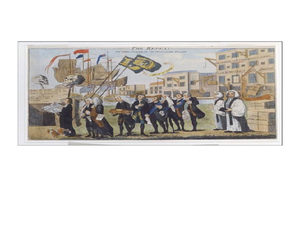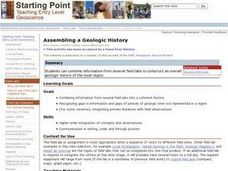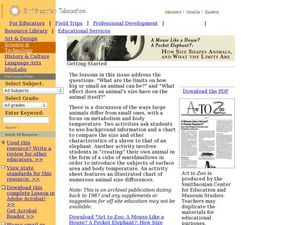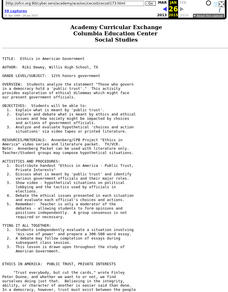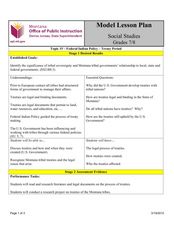Curated OER
What is Poetry?
Tenth graders are introduced to the poetic process. They onnect poetry to life in a meaningful way become more careful readers of poetry. They listen to a variety of poems, then write responses at the end of each adventure.
Curated OER
The Art of Political Cartoons in Revolutionary America
High schoolers analyze political cartoons. In this colonial America lesson, students examine the provided political cartoons and respond to analytical questions about each of them.
Curated OER
Assembling a Geologic History
Students combine information from several field labs to construct an overall geologic history of the local region. They are able to use published reports of the geologic history as they compile their own version.
Curated OER
Text Elements of Fiction and Nonfiction
Second graders examine the text elements associated with fiction and nonfiction texts. In this text elements lesson plan, 2nd graders listen to Anansi and the Moss Covered Rock by Eric A. Kimmel. They take formative assessments to...
Curated OER
Sink or Float?
Students make and test predictions about sinking and floating, and classify objects according to whether they sink or float.
Curated OER
SHAKESPEARE IN TODAY'S WORLD
Students, after an introduction to Shakespeare's "Othello," compare/contrast the themes in the play to today's society. In addition, they write their own script for the play of "Othello" based on predictions of what they think will...
Curated OER
Sink or Float?
Students will determine whether various objects sink or float in water. They do not need to explain why objects sink or float. They are rather to be encouraged to observe that the same objects will sink or float every time, i.e., that...
Curated OER
How Size Shapes Animals
Students investigate how size affects large and small animals differently. For this animal lesson plan, students determine how size affects different animals by constructing their own animal out of marshmallows. Once students create...
Curated OER
Bioethics: Where the Future May Take Us
Middle schoolers investigate bioethical issues. In this bioethical issues instructional activity, students research gene cloning, imaging technologies, transplantation, and other bioethical issues. Middle schoolers share their finding...
Curated OER
Growing and Harvesting Fruits and Vegetables
Students learn the various parts of a farm and what is grown on a farm. They also match fruits and vegetables to locations where they are grown.
Curated OER
Memory in Your World
Students identify similarities and differences between machines with memory and machines without memory. They illustrate how a machine with memory might fit into the student's world.
Curated OER
Ethics in American Government
Engage 12th graders in a series of activities focused on public trust and ethics in US Government. They view a series of videos, hold a class debate, and compose a short essay. Note: Suggested videos are listed but are not available...
Curated OER
Federal Indian Policy
Students recognize the provisions of federal Indian policy. For this Federal Indian Policy lesson, students research legal documents (treaties). Students research the Montana tribes. Students answer critical thinking...
Curated OER
The Art of Charity in Characterization
High schoolers garner knowledge of characterization of the pilgrims in Chaucer's Canterbury Tales and see that even the less savory characters must be flushed out in description of personality and physical traits.
Curated OER
Malia
Fourth graders begin their examination of the Hawaiian Islands. Using their island bookmarks from a previous lesson, they work together to put the information into a book. They identify the physical and human characteristics of the...
Core Knowledge Foundation
A Time for All Seasons - Spring
Celebrate the arrival of spring with this fun primary grade science unit. Engaging young scientists with a variety of hands-on activities and inquiry-based investigations, these lessons are a great way to teach children about...
Core Knowledge Foundation
A Time for All Seasons - Fall
The weather is cooling down and the leaves are starting to change color; fall is right around the corner. Celebrate this special time of year with this earth and life science lesson series that teaches children about the...
Core Knowledge Foundation
A Time for All Seasons - Summer
The sun is shining and the birds are singing, what better time to teach young learners about the fun season of summer. In this week-long science series, children learn how the rotation and orbit of the earth influence...
Curated OER
"Julie of the Wolves"
Fifth graders research life in Alaska and compare life there to their lives in this lesson. They read "Julie of the Wolves." They research through the novel and other reference books facts about the Alaskan climate and geography. They...
Curated OER
Ponyboy, What's a Theme?
Third graders seek supporting proof of major conflicts and themes in the novel, The Outsiders by S.E. Hinton. They utilize a worksheet imbedded in this plan which has them identify the conflict in each chapter of the book.
Curated OER
Poetry in Motion
Students create individual poems containing varied line lengths, punctuation, and rhythm, and explain how each contributes to overall effect of the poem.
Curated OER
Poetry Analysis Device: TPCASTT
Learners analyze the key elements of poetry using a mnemonic device. The device: TPCASTT (title, paraphrase, connotation, attitude, shifts, title and theme).
Curated OER
Juvenile Delinquency
Ninth graders analyze and interpret historical research by examining, analyzing, and forming opinions regarding primary resources. They compare/contrast social conflict, its causes and effects, in regards to continuity and change over time.
Curated OER
Impromptu Speeches
Learners formulate an impromptu speech about a given topic. In this public speaking lesson, students choose a topic from a deck of pre-written index cards and quickly present an impromptu speech. Learners use a rubric to review the...



